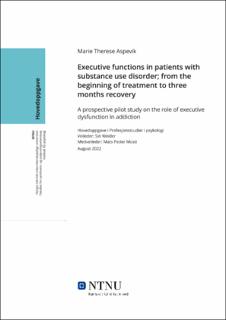| dc.contributor.advisor | Weider, Siri | |
| dc.contributor.advisor | Mosti, Mats Peder | |
| dc.contributor.author | Aspevik, Marie Therese | |
| dc.date.accessioned | 2022-12-24T18:19:14Z | |
| dc.date.available | 2022-12-24T18:19:14Z | |
| dc.date.issued | 2022 | |
| dc.identifier | no.ntnu:inspera:104435896:15885180 | |
| dc.identifier.uri | https://hdl.handle.net/11250/3039472 | |
| dc.description.abstract | Bakgrunn: Atferdsendringer er krevende og forutsetter at man er i stand til å følge mål, inhibere impulser samt tilpasse seg til endringer i omgivelsene. Dette er høyere nivå eksekutive prosesser som ofte er svekket hos pasienter med ruslidelser. Tidligere forskning viser at pasienter ofte har reduserte eksekutive funksjoner ved oppstart av behandling, men det er større usikkerhet knyttet til mulighetene for bedring etter behandling (Schulte et al., 2014). Målet med denne studien var å undersøke om pasienter som fullfører en tremåneders døgnbehandling for ruslidelse opplever bedring i eksekutive funksjoner. Betydningen av alder og type rusbruk ble også undersøkt da dette er egenskaper som kan belyse hvordan behandling kan tilpasses pasienters individuelle behov. Metode: Selv-rapporterte eksekutive funksjoner ble undersøkt ved hjelp av spørreskjemaet Behavior Rating Inventory of Executive Function-Adult Version (BRIEF-A). Skjemaet ble administrert ved behandlingsstart- og slutt for å undersøke endringer i samtlige tolv BRIEF-A delskalaer i pasientutvalget (N=22). Resultater: Pasientene utviste forhøyete skårer for eksekutiv dysfunksjon ved behandlingsstart. Dette gjaldt særlig for deltakerne med blandingsmisbruk, som hadde signifikant høyere dysfunksjon sammenliknet med deltakerne med monobruk. Det var derimot bare fem av tolv delskalaer på BRIEF-A som viste statistisk signifikante endringer fra behandlingsstart til behandlingsslutt. Dette gjaldt indeksene for Generell Eksekutiv Funksjon og Metakognisjon, samt subskalaene Inhibisjon, Selvmonitorering og Planlegging/Organisering. Gruppen med blandingsmisbruk hadde fortsatt noe forhøyede skårer for dysfunksjon etter behandlingsslutt, men under grensen for klinisk dysfunksjon. Konklusjon: Resultatene viste bedringer i eksekutiv dysfunksjon etter tre måneders døgnbehandling for ruslidelse. Til tross for at samtlige delskalaer viste forbedringer i dysfunksjon, fortsatte mange deltakere å utvise forhøyede nivåer dysfunksjon sammenliknet med normnivå. Dette understreker viktigheten av vurderinger av kognitiv funksjon i behandling, da dette vil kunne bidra til å tilpasse behandlingen til pasienters individuelle behov. | |
| dc.description.abstract | Background: Behavioral change is effortful and requires the ability to follow long-term goals, to inhibit impulses and to adapt to changes in the environment. These are high-level executive processes that are often impaired in individuals with substance use disorder. Prior research shows that patients often have impaired executive functions upon treatment initiation, but results are less conclusive regarding the potential for recovery (Schulte et al., 2014). The main purpose of the present thesis was to investigate whether patients who completed a three-month inpatient treatment program experienced changes in executive functions. Patient characteristics such as age and type of substance use were examined as these are factors that may further inform how treatment can be adjusted to fit the individual needs of patients. Method: Self-reported executive functions were assessed using the Behavior Rating Inventory of Executive Function-Adult Version (BRIEF-A). The questionnaire was administered at treatment initiation and at treatment completion to assess changes in all BRIEF-A subscales in the patient sample (N=22). Results: Patients manifested heightened levels of executive dysfunction upon initiation of SUD treatment. This was especially true for the polydrug group, which experienced significantly higher scores of dysfunctions compared to the monodrug group. However, only five of the subscales showed statistically significant changes in scores from treatment initiation to treatment conclusion. This includes the Global Executive Composite Index, the Metacognition Index, and the subscales of Inhibition, Self-Monitoring and Plan/Organization. Some dysfunction appears to persist in the polydrug group despite in-patient treatment at three months, however all scale scores for this group were reduced to non-clinical levels of dysfunction. Conclusion: The findings indicate that executive functions are improved following treatment completion. However, despite showing overall reductions in executive dysfunction, many respondents continued to manifest somewhat elevated scores on the BRIEF-A compared to norm levels. This points to the importance of considering cognitive function when adjusting treatment to the specific needs of the patient. | |
| dc.language | eng | |
| dc.publisher | NTNU | |
| dc.title | Executive functions in patients with substance use disorder; from the beginning of treatment to three months recovery. A prospective pilot study on the role of executive dysfunction in addiction | |
| dc.type | Master thesis | |
